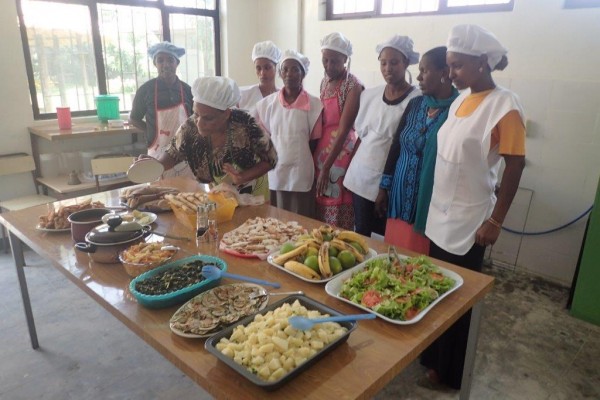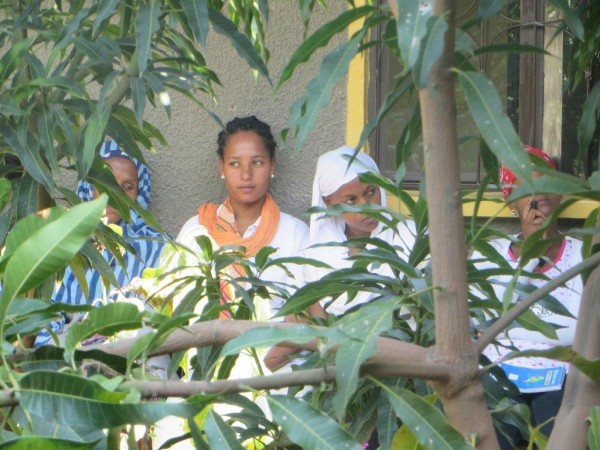Youth who return to Ethiopia from Arab countries are trained in Meki at the center run by the Community of Saint Paul

In August 2016 we began new cooking, sewing and hairdressing classes in Kidist Mariam Center, the training center that the CSP runs in Meki, Ethiopia. We also began Level II courses in sewing and cooking, and the number of students increased to 93. Over the course of 2016, we will have trained 160 women, and we celebrate that this can happen.
The majority of our students are young people who weren’t able to finish their studies, and now, due to their lack of training, do not have adequate jobs. Among them, we have a group of young 18 women who are back in Meki after having emigrated to Saudi Arabia or to Lebanon in search of work to support their families. In Ethiopia, many try this route to escape from poverty. However, in most cases, where they arrive to their destinations they find very different reality from what they expected: in the Arab countries they suffer all kinds of mistreatment and humiliations, and the opportunities are not as great as they thought.
Faced with this exploitation of immigrant women, Caritas International opened several shelters for young immigrants in the Arab countries. The young women who escape from these situations and arrive at the shelters receive psychological and material support and are supplied with documents so that they can return to their countries. Those who return to Ethiopia are received in a shelter in Addis Ababa. From there, they are connected with relatives, to try to reintegrate these young women back into their families. The work of reinsertion is complicated because many times they are rejected by their relatives. The families sent young, healthy daughters, filled of vitality, who many times return with babies and are psychologically very affected by the abuses they suffered during their journey.
The returned students who are at our center participate in training courses of sewing and cooking, while the Vicariate of Meki continues to work to reunite them with their families. In the classrooms they join other young people of their same age, many of whom lived through similar experiences. It’s amazing to see the interest they have in learning and their happiness at being treated with respect and valued for their talents. Upon seeing them, it’s hard to imagine the many difficulties they have endured in recent years.
Last Sunday, the owner of a new hotel near Meki invited us to eat at his restaurant so that he could show us his gratitude for his new cooks, Kasech and Zenafakech. They are two of our students in Level II cooking, both of whom returned from Lebanon. The food, service and attention we received were excellent. We were all very satisfied: our students, our boss, their cooking instructor and us.
We hope that, like Kasech and Zenafaketch, many other young women from our center can find good work. May they serve as an example so that those that continue thinking of emigrating to Arab countries know that, right here in Ethiopia, they also can have a good future. From the Kidist Mariam Center, we will continue working so that may be possible.
The majority of our students are young people who weren’t able to finish their studies, and now, due to their lack of training, do not have adequate jobs. Among them, we have a group of young 18 women who are back in Meki after having emigrated to Saudi Arabia or to Lebanon in search of work to support their families. In Ethiopia, many try this route to escape from poverty. However, in most cases, where they arrive to their destinations they find very different reality from what they expected: in the Arab countries they suffer all kinds of mistreatment and humiliations, and the opportunities are not as great as they thought.
Faced with this exploitation of immigrant women, Caritas International opened several shelters for young immigrants in the Arab countries. The young women who escape from these situations and arrive at the shelters receive psychological and material support and are supplied with documents so that they can return to their countries. Those who return to Ethiopia are received in a shelter in Addis Ababa. From there, they are connected with relatives, to try to reintegrate these young women back into their families. The work of reinsertion is complicated because many times they are rejected by their relatives. The families sent young, healthy daughters, filled of vitality, who many times return with babies and are psychologically very affected by the abuses they suffered during their journey.
The returned students who are at our center participate in training courses of sewing and cooking, while the Vicariate of Meki continues to work to reunite them with their families. In the classrooms they join other young people of their same age, many of whom lived through similar experiences. It’s amazing to see the interest they have in learning and their happiness at being treated with respect and valued for their talents. Upon seeing them, it’s hard to imagine the many difficulties they have endured in recent years.
Last Sunday, the owner of a new hotel near Meki invited us to eat at his restaurant so that he could show us his gratitude for his new cooks, Kasech and Zenafakech. They are two of our students in Level II cooking, both of whom returned from Lebanon. The food, service and attention we received were excellent. We were all very satisfied: our students, our boss, their cooking instructor and us.
We hope that, like Kasech and Zenafaketch, many other young women from our center can find good work. May they serve as an example so that those that continue thinking of emigrating to Arab countries know that, right here in Ethiopia, they also can have a good future. From the Kidist Mariam Center, we will continue working so that may be possible.










